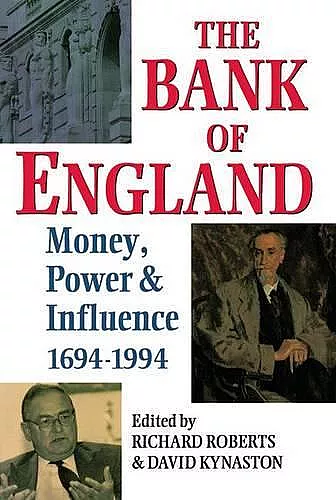The Bank of England
Money, Power, and Influence 1694-1994
Richard Roberts editor David Kynaston editor
Format:Hardback
Publisher:Oxford University Press
Published:18th May '95
Currently unavailable, and unfortunately no date known when it will be back

A landmark assessment of a unique institution
The Bank of England has played a crucial if sometimes little understood role in the life of the nation. This work aims to assess the major themes in the Bank's history: its relationship with government; its impact on the British economy; its position in the City of London; and its role in the international banking and monetary system.The Bank of England's tercentenary (July 1994), coming as it does with the future status of the Bank a subject of much discussion, is an apposite moment to offer an overview of the Bank's history as a whole. Obviously there have been several detailed histories of the Bank, but this collection of essays is the first attempt to identify the most important themes of the institution's history and put them in a long-term perspective. The main pieces will deal with the Bank's relations with government, its impact on the British economy, its role in international central banking, its position in the City of London, and its changing composition and management. In addition, in a piece likely to cause considerable interest, the Deputy Governor (Rupert Pennant Rea) will be looking at all these themes in a contemporary light and offering some thoughts about the Bank's future. Added value is given by two main appendices: a detailed chronology of the Bank's history; and a comprehensive listing of its governors, directors, and senior officials. In sum, this is a book that meets a clear intellectual need, while also being extremely convenient for those unwilling or unable to embark on the circa 2600 pages of the three main official histories. Contributors: D. Kynaston, A. Cairncross, P. Cottrell, R. Roberts, E. Hennessy, R. Pennant Rea,
`Includes a fascinating table depicting the rise of the state machine this century.' The Guardian
The book is generated by a backwrd-looking event, a conference to mark last year's celebration of the bank's 300th anniversary. But the essays tingle with forward-looking speculation- will the Old Lady of Threadneedle Street finally break free from the bad company of politicians? It is rare for a collection of essays to offer such a rich diet, a tribute to the editors' skill. * Financial Times *
The preface and introduction to this collection of essays...which includes several interesting, well-written and worthwhile contributions. * The Tablet *
Accessible survey of three centuries of the Bank's history. * Times Literary Supplement *
Provides an excellent historical summary. * Times Higher Education Supplement *
A distinguished group of historians and economists provide an authoritative assessment of the major themes in the bank's history. * Business Horizons *
This wide-ranging institutional survey will be useful to readers interested in British economic history or banking. * Choice *
The authors have ... provided a refreshing variety of retrospectives on different sub-periods of the Bank's 300 years and on different aspects of its evolution as a central bank. * The Economic History Review *
The book is beautifully produced ... in one good-sized volume there is here an excellent coverage of the origins, growth, and development of the Bank which draws on archives not previously exploited. It is a fitting commemorative volume for the Bank's 300th anniversary. * Business History *
The very praiseworthy ambition of the editors and organisers seems to have been to provide as much coverage as possible of the Bank's history in both its domestic and international setting from its founding to the present day - and to do this thematically ... The book is beautifully produced ... in one good-sized volume there is here an excellent coverage of the origins, growth, and development of the Bank which draws on archives not previously exploited. It is a fitting commemorative volume for the Bank's 300th anniversary. * Business History *
It is to the credit of the editors and the contributors that it represents both a celebration and a serious scholarly analysis of the Bank over the past three centuries ... This book makes two important contributions to understanding this debate. On the one hand, it provides an extremely valuable perspective on how the Bank of England has come to occupy such a critical and influential position in the British economy over the whole of its history. On the other, it underlines how much the Bank's role has altered since Norman became Governor. * Business Archives Sources and History *
this is a serious and scholarly book aimed at the specialist and not the general reader ... There is no shortage of good histories of the Bank of England, but no scholarly ones roam over long periods and analyse long-term developments in the context of specific influences exerted upon the Bank by external forces. This is the task of this book and it is achieved with distinction within 200 pages which is no mean feat; the contributors know their stuff ... a remarkably good, useful and ambitious book. The publishers have also done a good job for the relatively modest cover price. * John Orbell, Financial History Review, Vol 3 1996 *
All of the chapters can be read for substantial intellectual profit and it would be invidious to highlight individual contributions ... the editors are to be congratulated for assembling an excellent team of authors who, collectively, have produced an indispensable work of scholarship on a critically important national institution. * The Historical Associaton *
It succeeds in demystifying many of the Bank's more arcane activities and, in taking the long view, it does offer a different perspective on the Bank's evolution than was available before ... a considerable addition to our understanding of the financial history of modern Britain. * English Historical Review *
ISBN: 9780198289524
Dimensions: 241mm x 162mm x 24mm
Weight: 663g
328 pages